Watch: 'Ring of fire' solar eclipse stretches from Oregon to Brazil
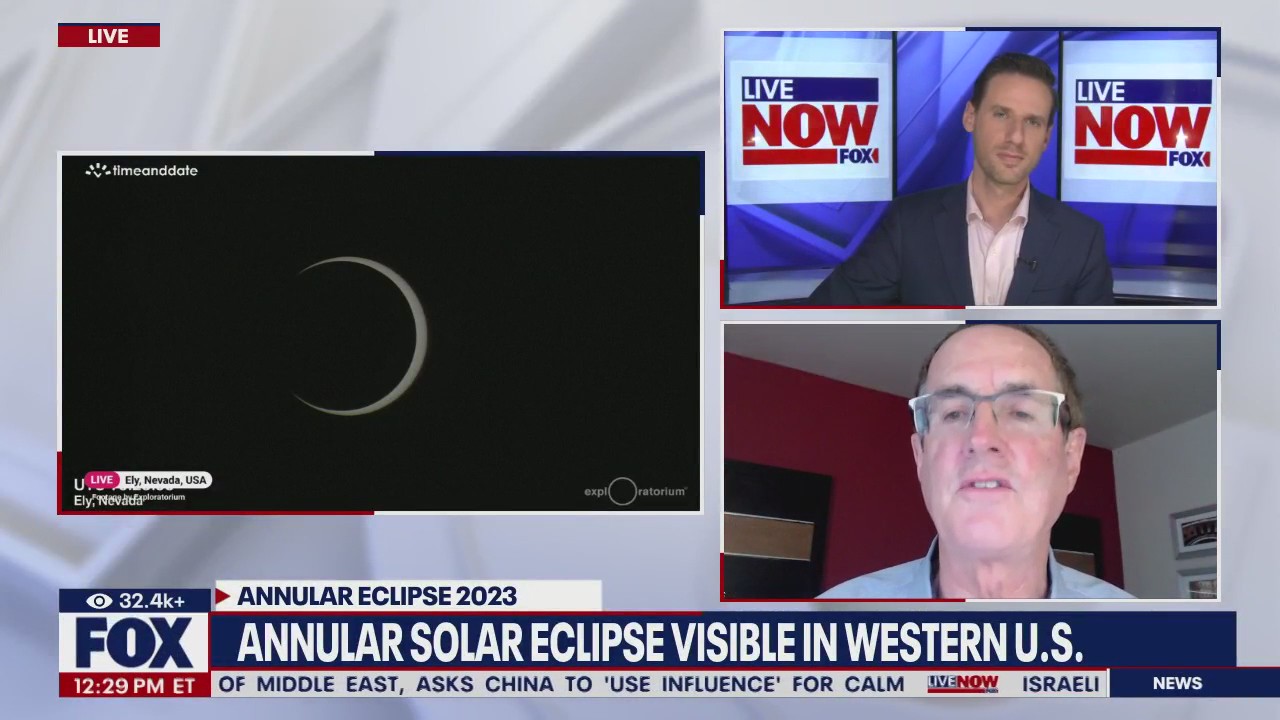
Annular Eclipse visible in western U.S.
The annual eclipse could be seen in several cities across the western U.S. Dr. Douglas Duncan at the University of Colorado joined LiveNOW from FOX's Josh Breslow to watch as the live cameras showed that "ring of fire."
A rare "ring of fire" eclipse of the sun that has millions across the Americas waiting with anticipation Saturday has at last appeared into view.
With the presence of cloudy skies, a NASA livestream of the phenomenon reported it in Eugene, Oregon, shortly after 9:15 a.m. local time. This came over an hour after a partial eclipse set in.
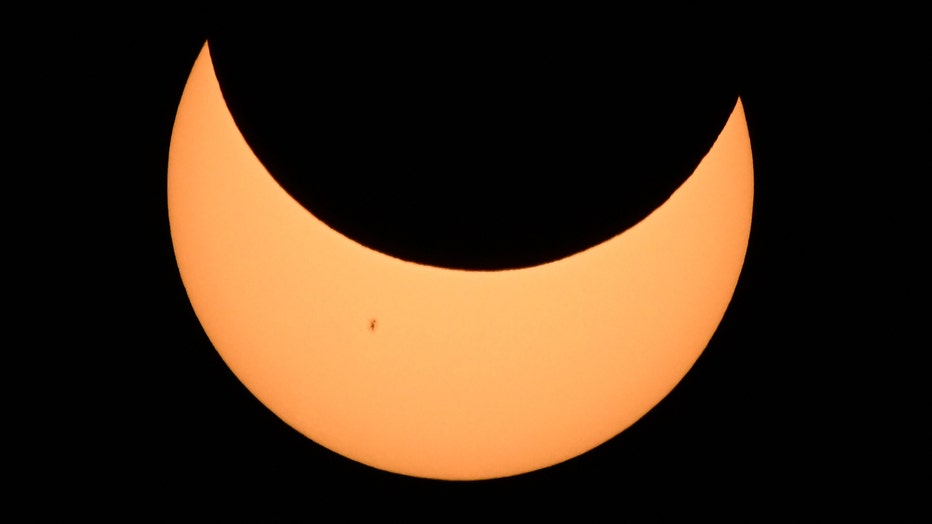
The Moon crosses in front of the Sun over Albuquerque, New Mexico, during an annular eclipse on October 14, 2023. (Photo by Patrick T. Fallon / AFP) (Photo by PATRICK T. FALLON/AFP via Getty Images)
For the small towns and cities along its narrow path, there was a mix of excitement, worries about the weather and concerns they'd be overwhelmed by visitors flocking to see the celestial event, also called an annular solar eclipse. Clouds and fog threatened to obscure the view of the eclipse in some western states, including California and Oregon.
Members of a crowd at the Eugene Science Center in Eugene were desperately wishing for the clouds on the horizon to clear. Dozens of people set up telescopes and cameras with special filters in the hopes of capturing the celestial event.
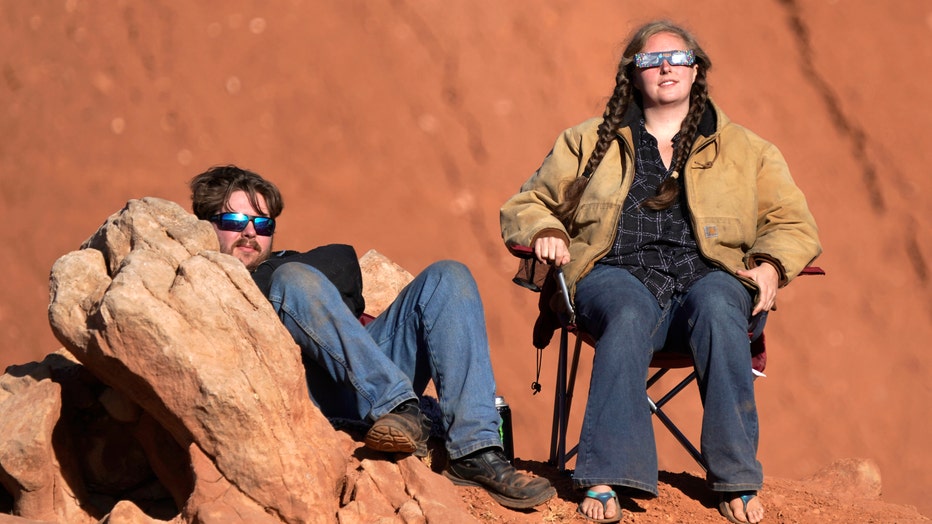
A couple with solar glasses watches the Annular Solar Eclipse that began shortly after 9am on October 14, 2023 in Capitol Reef National Park, Utah. (Photo by George Frey/Getty Images)
Shuumei Kodama, 11, woke up at 4:30 a.m. to make the drive from Portland, Oregon, with his dad. Eclipse glasses in hand, he explained that he’s been obsessed with space since he was 5.
READ MORE: Solar eclipse, Orionid meteor shower make October skygazing forecast a standout
"It seems like one of the coolest things I’ve ever heard of," he said of the annular eclipse. "I want to see every type of eclipse possible one day. That’s my goal."
Path of the ring of fire solar eclipse

Annular eclipse: What about 2024?
The next full eclipse is just months away. Dr. Bruce Betts with the Planetary Society joined LiveNOW from FOX's Josh Breslow to explain how this eclipse differs from that one.
Unlike a total solar eclipse, the moon doesn’t completely cover the sun during a ring of fire eclipse. When the moon lines up between Earth and the sun, it leaves a bright, blazing border.
Saturday’s path: Oregon, Nevada, Utah, New Mexico and Texas in the U.S., with a sliver of California, Arizona and Colorado. Next: Mexico’s Yucatan Peninsula, Belize, Honduras, Nicaragua, Costa Rica, Panama, Colombia and Brazil. Much of the rest of the Western Hemisphere gets a partial eclipse.
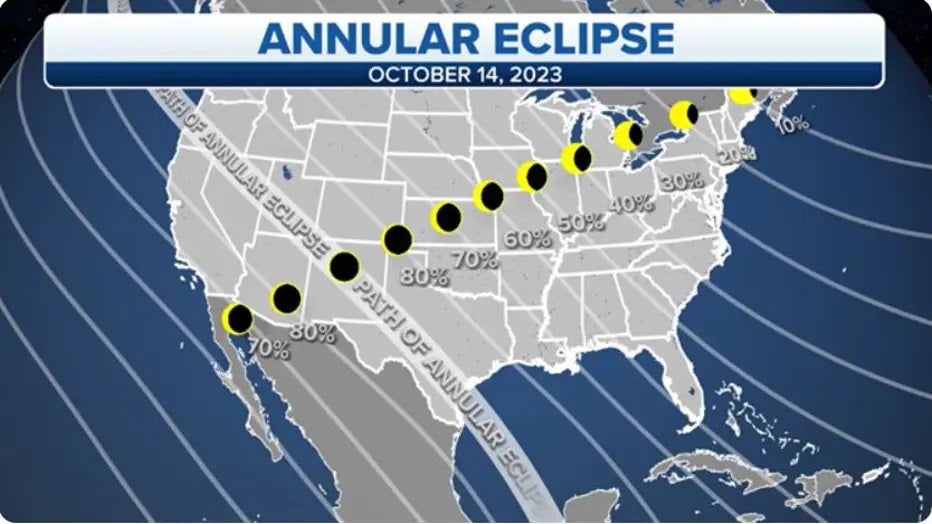
Annular solar eclipse Oct. 14, 2023 map (FOX Weather)
The celestial event brought eclipse watchers from around the U.S. to remote corners of the country to try to get the best view possible. At Bryce Canyon national park in southern Utah tiny lights could be seen along a well known trail that snakes through a valley of red rock hoodoos as eclipse enthusiasts hit the trail before sunrise to stake out their preferred spot
"I just think it's one of those things that unites us all," said John Edwards, a cancer drug developer who traveled alone across the country to try to watch the eclipse from Bryce Canyon. "I just think it's seeing these unique experiences that come rarely is what got me here. This is about as rare as it gets."
Which states had the best views?
Viewing all depends on clear skies — part of the U.S. path could see clouds. NASA and other groups planned to livestream it.
Tens of thousands were getting a double treat in Albuquerque, New Mexico, where the eclipse coincided with an international balloon fiesta that draws close to 100,000 spectators for early morning mass ascensions of hundreds of colorful hot air balloons. Organizers gave out 80,000 pairs of viewing glasses Saturday morning.
READ MORE: NASA finds water, building blocks of life in largest-ever asteroid sample
Allan Hahn of Aurora, Colorado, has been attending the festival for 34 years, first as a crew member and then as a licensed balloon pilot. His balloon, Heaven Bound Too, was one of 72 selected for a special "glow" performance as skies darken during the eclipse, where pilots use their propane burners to light up their balloons on the field.
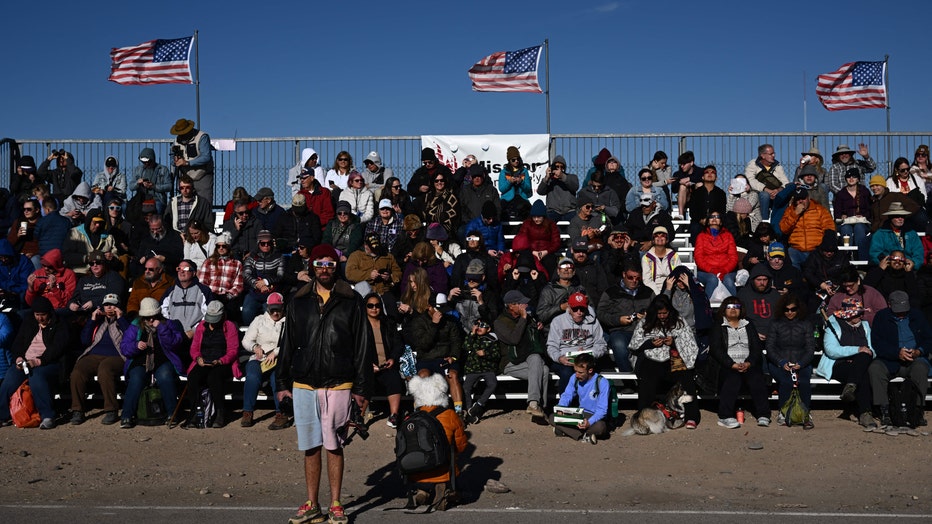
People watch the beginning of the annular eclipse in Albuquerque, New Mexico, on October 14, 2023. (Photo by Patrick T. Fallon / AFP) (Photo by PATRICK T. FALLON/AFP via Getty Images)
"It’s very exciting to be here and have the convergence of our love of flying with something very natural like an eclipse," he said.
Viewers on the East Coast were prepared to see less of the event — close to a quarter eclipse around midday in some areas, such as New York City — but were nonetheless geared up to watch the skies. In Maine, viewers expected to see only about 12% of the sun covered, but the Clark Telescope on the grounds of the Versant Power Astronomy Center at the University of Maine was open to the public.
The planetarium was selling safety glasses for $2 Saturday to encourage safe viewing, said Shawn Laatsch, director of the Versant Power Astronomy and the Maynard Jordan Planetarium
"As the Moon passes between the Earth and the sun, it casts its shadow on our planet," said Laatsch. "In a very real sense, solar eclipses are ‘made in the shade’ of the moon."
Colombia’s Tatacoa desert was playing host to astronomers helping a group of visually impaired people experience the eclipse through raised maps and temperature changes as the moon blots out the sun.
At the Cancun Planetarium, young visitors built box projectors to indirectly and safely view the ring of fire. The ancient Maya — who called eclipses "broken sun" — may have used dark volcanic glass to protect their eyes, said archeologist Arturo Montero of Tepeyac University in Mexico City.
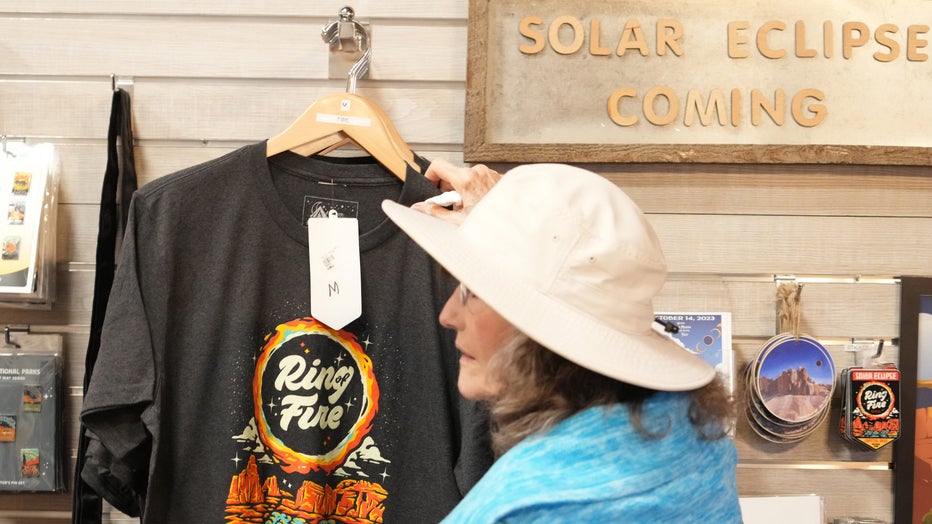
A woman looks at an eclipse shirt for sale in the park headquarters gift store on October 13, 2023 in Capitol Reef National Park, Utah. An Annular Solar Eclipse will pass over Torrey and Capitol Reef National Park on the morning of October 14th. (Pho
Towns and national parks in the path braced for a huge throngs. Officials in Oregon's Klamath County urged residents to stock up on groceries and fill their gas tanks in case traffic backs up on its two-lane highways. Utah's Bryce Canyon expected Saturday to be the park's busiest day of the year, spokesperson Peter Densmore said. Brazil's Pedra da Boca state park, known for its rocky outcrops for climbing and rappelling was also expecting crowds.
The entire eclipse — from the moment the moon starts to obscure the sun until it’s back to normal — is 2 1/2 to three hours at any given spot. The ring of fire portion lasts from three to five minutes, depending on location.
The next ring of fire eclipse is in October next year at the southernmost tip of South America. Antarctica gets one in 2026. It will be 2039 before another ring of fire is visible in the U.S., and Alaska will be the only state in its direct path.
Where’s the total solar eclipse in April 2024?

North American solar eclipse coming in 2024
In 2023 and 2024, Americans will have the rare opportunity to witness two spectacular celestial events: an annular solar eclipse and a total solar eclipse.
April’s total solar eclipse will crisscross the U.S. in the opposite direction. It will begin in the Pacific and head up through Mexico into Texas, then pass over Oklahoma, Arkansas, Missouri, Illinois, Indiana, Ohio, the northern fringes of Pennsylvania and New York, and New England, before cutting across Canada into the North Atlantic at New Brunswick and Newfoundland. Almost all these places missed out during the United States’ coast-to-coast total solar eclipse in 2017.
It will be 2039 before another ring of fire is visible in the U.S., and Alaska will be the only state then in the path of totality. And it will be 2046 before another ring of fire crosses into the U.S. Lower 48. That doesn't mean they won't be happening elsewhere: The southernmost tip of South America will get one next October, and Antarctica in 2026.

